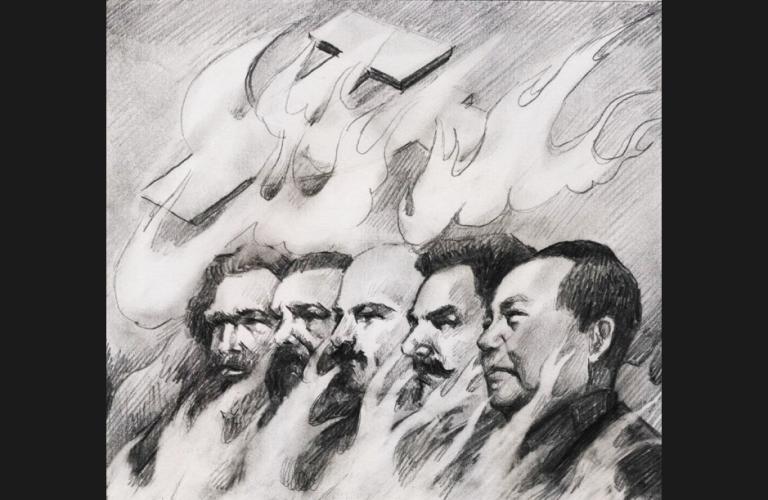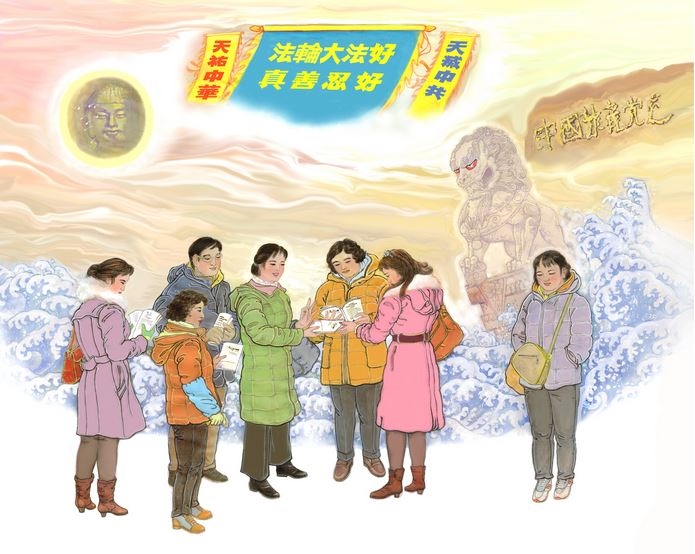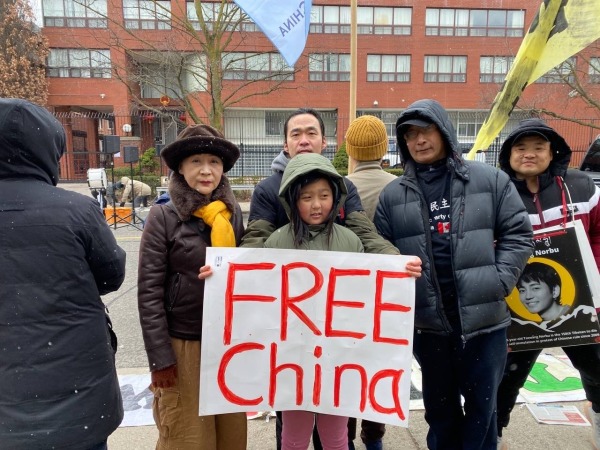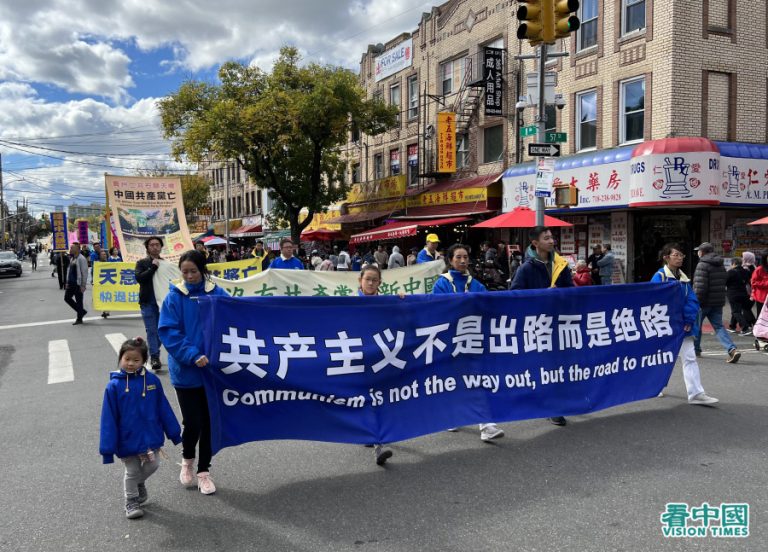First published in 2006 by the Chinese-language Epoch Times, this series lays out in detail the vast system of Communist Party culture that dominates mainland China today and how it violently replaced the ancient moral and spiritual heritage of the Chinese people. Vision Times is proud to present a translation of Disintegrating the Culture of the Chinese Communist Party that sheds light on the fundamental characteristics of the world’s biggest communist state, while keeping true to the message intended by the original authors.
Traditional Chinese Culture and Communist Party Culture (Part IV)
Continued from Chapter One (Part III).
The philosophy of struggle
Communism holds that the state of humanity is that of endless fighting between different classes or social groups, and it is only by overthrowing the old society and its values that humankind will construct a world free from oppression and want.
Marx and Engels wrote in the “Communist Manifesto” that “the history of all hitherto existing society is the history of class struggles.”
“Oppressor and oppressed,” they said, “stood in constant opposition to one another, carried on an uninterrupted, now hidden, now open fight.”
Success
You are now signed up for our newsletter
Success
Check your email to complete sign up
Following the doctrine of historical materialism, the communists prophesized that class struggle would inevitably result in the victory of the proletarians over the capitalist bourgeoisie. Leading the proletariat in the struggle with the bourgeoisie and towards socialism would be revolutionary vanguards — the Communist Party.
This basic concept of class struggle was established by Marx and put into practice by Lenin, who led the Bolsheviks to seize power in Russia. Similar movements led to the establishment of totalitarian communist regimes in countries such as China, Cuba, and Vietnam, while elsewhere it was simply imported through military conquest, as with the Soviet-controlled communist states of Eastern Europe or North Korea.
In democratic countries, a wide range of political and social movements do not practice Marxism-Leninism or openly advocate violent revolution, but follow the same underlying pattern of class struggle and dialectical materialism. Whether in the East or in the West, the goals are often similar: to destabilize and overthrow the “oppressive” old society, including its cultural heritage, history, and spiritual faith.
Chinese culture is replete with moral virtues such as zhong (loyalty), xiao (filial piety), ren (benevolence), and yi (righteousness) emphasized in Confucianism. Belief in divine justice and the heavenly mandate was reflected in many aspects of life and society.
Since its founding in 1921, the Chinese Communist Party (CCP) has attempted to suppress or reinterpret traditional Chinese culture in favor of its atheist materialism and philosophy of class struggle.
According to the CCP’s method of class analysis, the whole of Chinese history can be summed up as the cyclical struggle between tyrannical feudal rulers and downtrodden subjects. Regardless of how many good deeds or accomplishments to their name, the emperors and their ministers are denigrated and criticized, because they represented the exploiting class. By contrast, rebel leaders are upheld as revolutionary heroes, no matter how many murders or rapes they committed, because they represented the oppressed proletarian class. In fact, the Chinese communists reserved particular disdain for benevolent officials, whom they regarded as having delayed “class contradictions” and thus extended the rule of the “oppressing” class.
Traditional Chinese belief holds that “there is destiny in life and death, fortune and status are determined by Heaven.” Good deeds are rewarded and evil punished with retribution. Regardless of one’s status in society, one could “provide for the masses if wealthy, and cultivate one’s personal virtue if poor.” The idea that all history is the “history of class struggles” did not exist in China before the rise of the communist movement.
Confucianism, which governed secular Chinese society for thousands of years, is focused on harmony among kin and kindness among friends. In Communist Party culture, the doctrine of class struggle trumps all bonds of kinship or friendship. An example can be found in the communist “model opera” Legend of the Red Lantern: Li Yuhe, an underground communist agent, sings: “People say the emotion felt in love of kin runs deep, yet I think that the sentiment of class is weightier than Mount Tai.”
Slogans such as “whether we are close is decided by class” further illustrate the principle: if one is recognized as a “comrade,” he or she can be accepted into the revolutionary “family”; what awaits otherwise is merciless suppression. Under the CCP, the labels of “comrade” and “class enemy” override the traditional moral obligations and sentiment among family and friends. When required for the sake of class struggle, children may turn on their parents, husbands and wives report each other to the authorities; family members criticize and curse another in public, even beating their loved ones to demonstrate their revolutionary character and prove their loyalty to the Communist Party.
As explained previously, the Communist Party’s materialism cannot explain or appreciate anything of the spiritual realm. “Beauty,” such as that of a rainbow or a sunset, can only be explained as varying light waves on the electromagnetic spectrum; “love” is merely the result of hormonal changes in the human body; honorable deeds and sentiments are reduced to trivial and mundane acts of subjective favor.
To the CCP, what is upright and noble in human nature presents obstacles to its absolute rule, for the Party demands not honor and virtue, but an unflinching willingness to obey the Party and its leadership. At times, the Party member must be able to suppress his or her “human nature” and demonstrate “Party character.” This means unswerving adherence to the Party line, no matter how absurd, and the ability to carry out any directive, no matter how inhumane.
For the purpose of struggle, the CCP can promote an “ascetic” facade, denying love and luxury in favor of comradely teamwork and Spartan endurance. In recent decades, however, the Party made a 180-degree turn, encouraging maximal indulgence in material comfort and sensual desire. After a generation of enforcing sexual abstinence and androgynous fashion to strengthen the fight for the Communist Party, the CCP allowed society to run loose, no longer inundating the country with ideological propaganda, but instead with pornography, casual sex, extramarital affairs, and ostentantious displays of wealth and status. Such reversals abound throughout the CCP’s history, but the aim is always the same: to maintain communist rule and continue the communist struggle.
Under the CCP, there is no unchanging standard of morality, justice, or beauty; there are only the dictates of power and the unceasing calls to struggle. Ever since its founding over a century ago, the Communist Party has been driven by its violent hatred of “class enemies,” launching campaign after campaign to eradicate and “rectify” its opponents. Hatred is a fundamental element of communism; thus, virtues such as compassion, love, kindness, and fidelity become its natural enemies.












